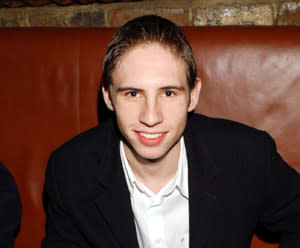A member of the millionaire’s club since the age of 15 – just how did Dominic McVey make his money?
It all began when he couldn’t get the scooter he wanted, so found a way to import them himself. At the time Dominic McVey was in school, a few months later he was a millionaire and he hasn’t looked back since.

Dominic McVey's rise to success began in 2000 when he was just 15, he’s now worth an impressive £7 million. While his classmates were climbing trees and doing their homework, McVey had spotted an opportunity to cash in on the latest craze that had already proved a hit in the US.
While searching for credit card Visa on the internet, McVey mis-spelt it and came across Viza collapsible micro-scooters that were being sold in the US. Determined to get one but unable to afford it, he asked the company to give him one for free as he was sure he could sell the scooters in the UK. It refused initially but then said if he bought five it would give him one scooter for free.
From that point on there was no stopping him. He raised the cash to buy five scooters by organising under-18s discos, trading in stocks and shares using his dad’s credit card and selling mini disc players in Japan.
He easily flogged the five scooters to friends and family, the next week he sold 10. Winning the European distribution rights for the scooters meant that two years later he’d sold 11 million units and the import business – which has seen grown men commute to work on the scooters – had made him a millionaire.
By the age of 18 he’d been appointed “As a Pioneer for Britain in Entrepreneurism” by the Queen. And now, still only 27, his business portfolio includes property, cosmetics, pharmaceuticals and publishing and sees him ranked along chart-topping pop stars and lottery winners on the latest ‘Rich List’.
[Related feature: How one woman made a billion from big pants]
Young, gifted and ignored
His age often meant he found it difficult to be taken seriously by the companies he tried to do business with. However, this wasn’t something he let stand in his way.
“I blagged it a lot,” he told startups.co.uk. “A lot of the business I did was over the phone or on the internet. I was very good with computers at the time and had friends who were great with IT, so I had great presentations.”
Not surprisingly, McVey had little time for and little interest in school. Too busy running a business to go to lessons, he was kicked out at one point but still managed to pass nine GCSEs.
He didn’t bother with A-levels or university – but then why would you when you already had wealth other schoolboys only dream of? Coming from a modest background and the East End of London, McVey knew he had to work hard for his money.
“I've always wanted to make money,” he told ‘The Independent’. “When I was very young my dad told me that if I worked hard and went to university, I might be able to walk on to a plane and ‘turn left’ when I was in my 30s, but I wasn't prepared to wait that long.”
McVey’s parents tied up much of his fortune in trusts which meant the young millionaire had to carry on working. A raft of projects followed from setting up record labels to selling toilet seats.
[Related feature: How Alan Sugar made his money]
Beyond scooters
It wasn’t all plain sailing though; McVey organised an event that failed miserably and saw him lose a lot of money and, inevitably, he also went out and spent a lot of money as most young men in his position would.
But in 2004 he joined forces with another young entrepreneur, Simon Tate, and together they set up a new company called Kew Health and Beauty.
The company aimed to help other firms in the lucrative health and beauty space with product formulation, packaging, design and distribution. The pair started up the business with just £15,000 and within two years it had a turnover of £5 million.
In 2009 he bought lads’ mag ‘Front’ despite the men’s magazine sector suffering a downturn at the time. Together with business partner Francis Ridley and their company Kane, he bought the magazine for £87,500 from Flip Media, despite the title having just made a net loss of more than £155,000. The move made him the UK’s youngest national magazine publisher.
The same year saw McVey named Britain's second most influential business person under the age of 30 in the “Top 30 power players under 30” list by ‘The Sunday Times’. Today other business interests include fashion and music. He is also an advisor on entrepreneurialism to the Department of Enterprise, Trade and Employment of the Irish Government and has appeared on TV shows including ‘The Verdict’ and ‘Millionaires’ Mission’.
McVey’s certainly one to watch for entry on to the definitive ‘Sunday Times Rich List’. This year only the top six of the richest under-30s made it to on the main list of the country’s 1,000 richest people but at just 27, McVey has plenty of time to shoot up the ranks.
[Related story: Britain’s rich get richer]

 Yahoo News
Yahoo News 